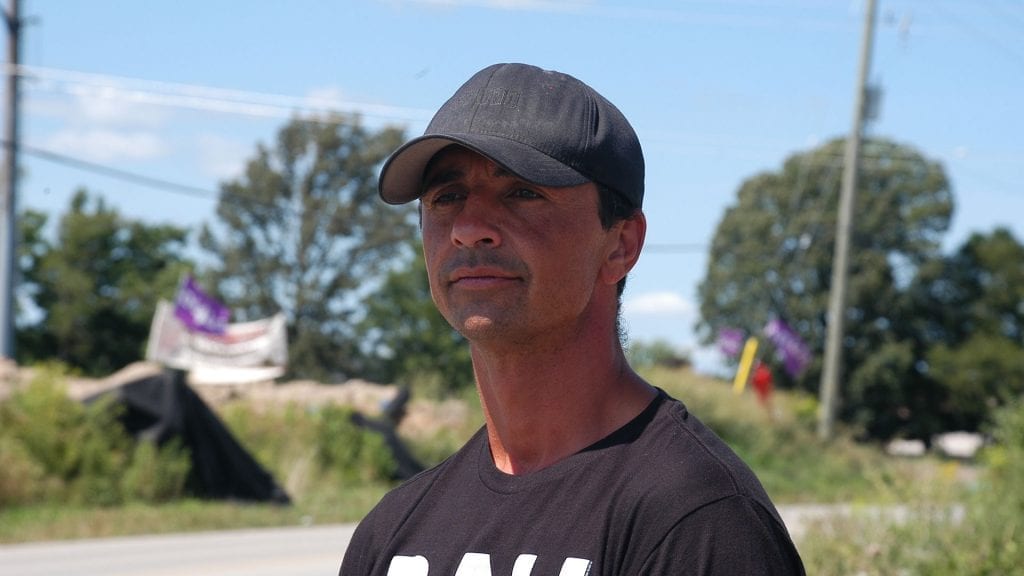
Skyler Williams and Justice John Harper went back and forth several times in a Thursday court hearing in Cayuga, Ont. Photo: Brett Forester/APTN
The spokesperson for the 1492 Land Back Lane camp in Caledonia, Ont. may be on the hook for $20 million in damages after an Ontario Superior Court judge found him in contempt of a court order, tossed out his evidence and made two injunctions permanent.
That order means the camp must be dismantled and prohibits road blockades in the municipality of Haldimand County southwest of Toronto.
“For this court to make a decision that is going to further alienate my people from this process or any other, I think, speaks to the deeply prejudicial nature and the estrangement of Haudenosaunee people from the process,” Skyler Williams told the court.
Williams had put forward a constitutional question and asked that the provincial and federal Crown be named as third parties to the hearing.
But Justice John Harper said no and wouldn’t budge.
“You cannot resort to disobeying a court order and at the same time seek orders of the court,” he ruled Thursday afternoon – before the court muted Williams and continued with the hearing.
“I find that Mr. Williams continues to be in contempt, despite being given the opportunity to purge that contempt and be allowed to participate,” Harper continued. “Any material pleadings that he has filed – which I have not seen, but I understand that he’s filing a statement of defence and a counter claim – that they will be struck.”
In that statement of defence, Williams counters that the Crown, not him, should be liable for damages for failing in their duty to consult with the community regarding development of the disputed parcel.
“The claim is that the Crown is liable for those and any other damages due to their negligence in failing to ensure that the Duty to Consult was fulfilled on lands known to them to be legitimately contested by the people of Six Nations,” said his rejected affidavit filed on Tuesday.

Foxgate Developments filed the claim against the camp, which has halted development of the McKenzie Meadows subdivision for over three months, along with the request for a permanent injunction. Haldimand County holds the other one.
People from the Six Nations of Grand River occupied the site on July 19, saying it’s unceded Haudenosaunee territory and drawing attention to the nations’ long-unresolved land rights grievances.
The Ontario Provincial Police (OPP) Public Order Unit raided the camp on Aug. 5 using rubber bullets, a taser and arresting nine people. The community responded by blocking roads, lighting tire fires, torching an excavator and shutting down CN Rail tracks.
Police have now arrested 33 people. The OPP are required by law to assist the court sheriff by enforcing the injunction.
But a court filing from a senior officer said police fear another raid will prompt more backlash, calling force “a blunt instrument that cannot resolve the issues underlying land disputes of this nature.”
Chief Supt. John Cain said the OPP believes “critical infrastructure” such as train tracks, highways and bridges would be targeted again.

The judge reiterated that the McKenzie Meadows dispute is “not a land claim.”
The reality is complex and, as Williams said in his stricken submissions, intertwined with the colonial dispossession of the Six Nations from lands granted them in 1784.
“I think in your ruling you state that we never made a land claim. From 1820 to 1920 that’s all our people did was try to remove squatters from our lands,” Williams told the court.
“We petitioned government, we issued notice of trespass, and then in 1920 it was illegal for us to even hire a lawyer to defend ourselves anyway – and that carried right into the ’50s. After that it was residential school and our children were being kidnapped off our streets. This is the reality of what our people have dealt with for the last 200 years.”
The disputed parcel is located in former Oneida Township on the south side of the Grand River, once an Oneida Nation village, now subsumed by Caledonia in the municipality of Haldimand County.
The county draws its name from the Haldimand Proclamation which granted the Six Nations the entirety of the Grand River watershed to settle and live on forever after they sided with the British during the American Revolution. But through illegal sales, squatting or disputed land surrenders they lost 95 per cent of the settlement.
Read more:
Conflict in Caledonia: A timeline of the Grand River land dispute
‘They are going to try and criminalize us’: Development standoff marks 48 days
They filed 29 land claims against Canada between 1982 and 1995. Only one was settled.
Claim No. 16 covers former Oneida Township. Research conducted by Six Nations Lands and Resources Department argues that the chiefs never surrendered Oneida, but reserved it for future settlement.
“Six Nations were deprived of continual rental revenues by the sale of the lands in the Oneida Township that were to be reserved for leasing purposes,” says a 2015 research booklet. “Six Nations did not receive full and fair compensation for the lands sold.”
Ottawa closed this and all other unsettled claims after the nations sued Ontario and Canada in 1995. This lawsuit seeks an accounting for all cash, lands or other assets that Canada may owe.
The Crown sold the disputed parcel to a third party in 1853, prior to which it was occupied by squatters. The claims want that cash paid out in full – with interest.
The Lands Department argues the community could be owed up to $6.2 trillion in 2020 depending how interest is calculated stemming from alleged misuses of funds. The research explains that the community launched its accounting claim out of desperation and frustration with the shortcomings of the specific claims process.
“Canada’s Specific Claims Policy is a failure and no justice for Six Nations can be achieved by adhering to that policy,” said a different publication.
Canada reformed the specific claims process in 2008 when Parliament passed the Specific Claims Tribunal Act. The reform came as a response to a 2006 Senate study undertaken partially in response to the previous Caledonia dispute.
The Senate heard that it took, on average, 10 years to settle claims and that given the backlog it would take 90 years to settle them all even if no new ones were filed. The Tribunal was supposed to speed up the process.
But it can only award a maximum settlement of $150 million – and the Six Nations believe they’re owed far more than that.
Despite the glacial pace of litigation and the established land claim process, the judge urged Williams and others to go that route.
“Resolving of grievances, being successful in advancing claims, must be done in a reasoned, rational and civil manner. Resorts to negotiations with the federal government and provincial government can take place. That is one of the options,” said Harper.
“There are land claim tribunals in which the grievances and the assertions of claims can be brought before the established statutory land claims tribunals. But what is not an option is to take the law into your own hands, to occupy others’ lands, to prevent them from advancing the development of their lands when they sought all the approval.”
Williams and Harper also went back and forth several times on the question of leadership. The judge previously found him to be a “protest leader,” which made Williams liable for damages.
“Haudenosaunee Law is based on consensus for decision making, as such all Individuals contribute to a collective voice,” replied Williams’s affidavit.
“I have not been granted a position of leadership based on Haudenosaunee Law.”
The judge wouldn’t hear it. A date for damages proceedings hasn’t been set.









